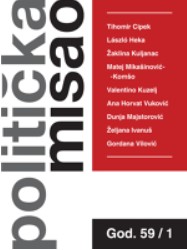CRNOGORSKO NACIONALNO PITANJE: PRAVNE POSLJEDICE ODLUKA PODGORIČKE SKUPŠTINE 1918. GODINE
THE QUESTION OF NATIONALITY IN MONTENEGRO: LEGAL CONSEQUENCES OF THE DECISIONS OF PODGORICA ASSEMBLY IN 1918
Author(s): László HekaSubject(s): Politics and religion, Politics and society, Nationalism Studies, Pre-WW I & WW I (1900 -1919), Eastern Orthodoxy, Politics and Identity, Peace and Conflict Studies
Published by: Fakultet političkih znanosti u Zagrebu
Keywords: Montenegro; Montenegrin National Question; Podgorica Assembly; Christmas Uprising; Serbian Orthodox Church; Montenegrins;
Summary/Abstract: The question of nationality in the Balkans, especially in the South-Slavic territory, has always been burdensome and it has historical, legal, and political connotations. After the bloody breakup of the former Yugoslavia, the question of Montenegrins’ national identity and their relationship with Serbia and the Serbs has intensified over the past twenty years. The relationship between these two nations became strained on the eve of the First World War and this culminated in 1918, when Belgrade, with the help of Montenegrin Serbs, annexed the internationally recognized Kingdom of Montenegro. Since then, the branch declaring itself to be Serb in the national sense remains strong among the Montenegrins. However, the Montenegrin population voted for independence in the referendum held in 2006. Since then, there have been two views on national and state history, culture, and identity of the smallest post-Yugoslav republic. Fifteen years after the restoration of statehood (21 May 2021), the population is as divided as it was at the time of independence. In this paper, we place special emphasis on the 1918 Podgorica Assembly, which is the starting point of Serbian-Montenegrin disputes regarding nationality and statehood.
Journal: Politička Misao
- Issue Year: LIX/2022
- Issue No: 01
- Page Range: 24-48
- Page Count: 25
- Language: Croatian

